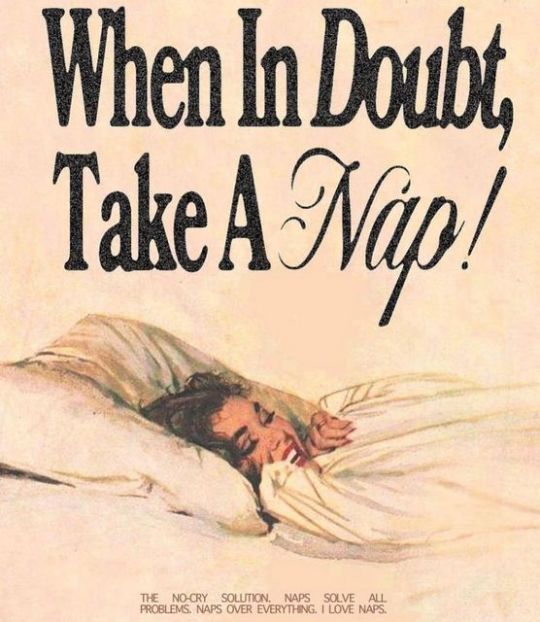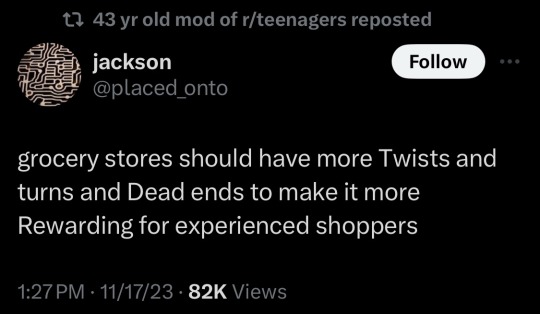Text
I hate when some random bitch I don’t know has me blocked. What could I have possibly done. I am perfect in every way
#me at labour party conference in 2019 when someone was making a speech onstage so i looked up who they were#and discovered they had blocked me on twitter ???????????#tbf their speech was a bit annoying but they were literally just a random member from a random CLP LOL!!!!!#i had never heard of them before....... i did used to have an insane online footprint though.#im reformed now x and i would never go to labour party conference xx#tmi
5K notes
·
View notes
Text
dts very much implying that gunther retired from F1 to go run a vineyard in the dolomites w the love of his life mattia binotto
1K notes
·
View notes
Text
#8.....#red wine-white wine-apple cider-white rice-zhenjiang-malt-balsamic-distilled white#lotta cuisines to cover!
1K notes
·
View notes
Text
very classic of me to be not only 20 years late to house md but also a year late to the 2023 house revival......... the need to speak about dr robert chase is overwhelming me mind body and soul
#chase and house i am obsessed..... they don't belong together but i think in the interim they should have a fucked up ongoing thing#that makes them both worse but brings their issues to the surface in a way that leads them on to something more inevitable#this stupid australian twink really got me. so identifiably My Guy unfortunately maybe the most My Guy ever......#people saying they found him boring in early seasons i do not understand you#house md#tmi
5 notes
·
View notes
Text
legitimately cannot explain how much House MD has eaten away at my brain over the past 5 days. what did they put in that show.
2 notes
·
View notes
Text
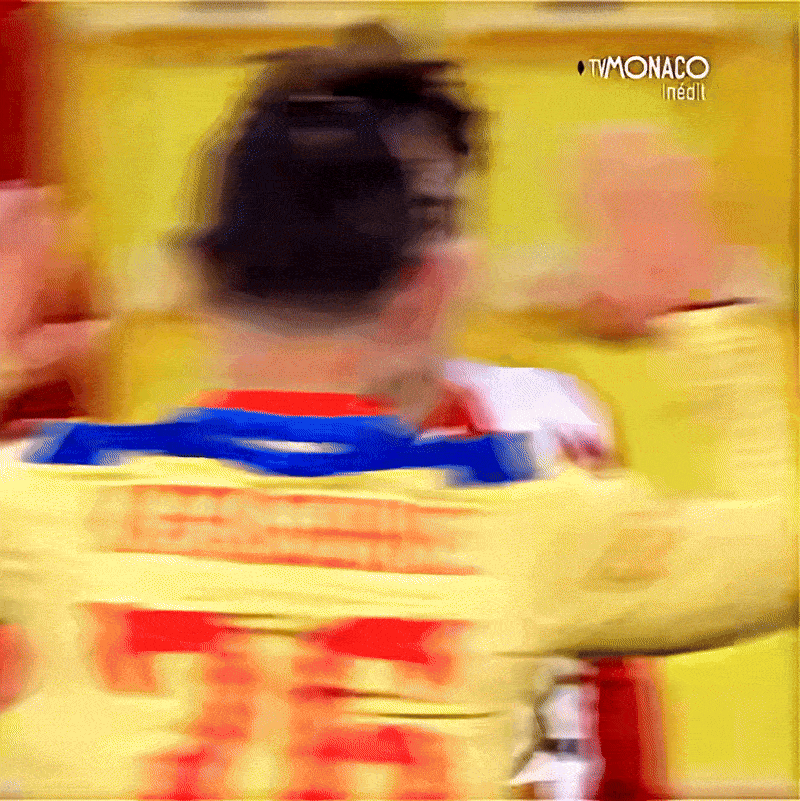

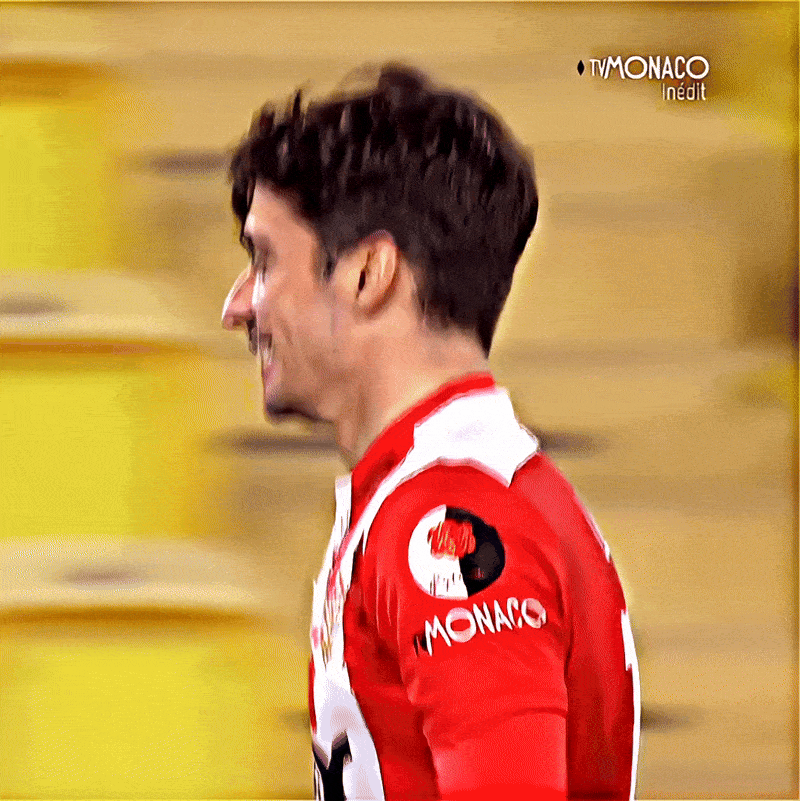

Charles at the Fight Aids Cup 2024 // 23.01.24
#so cruel that he is good at racing and bad at Sports when he deserves to be#on the pitch sweaty laughing getting tossed about by his teammates#charles
1K notes
·
View notes
Text
life update I've become consumed by hilary mantel's 1992 French revolution novel a place of greater safety & I am here with the message that fictionalised camille desmoulins is who you all WISH charles leclerc would be
1 note
·
View note
Text


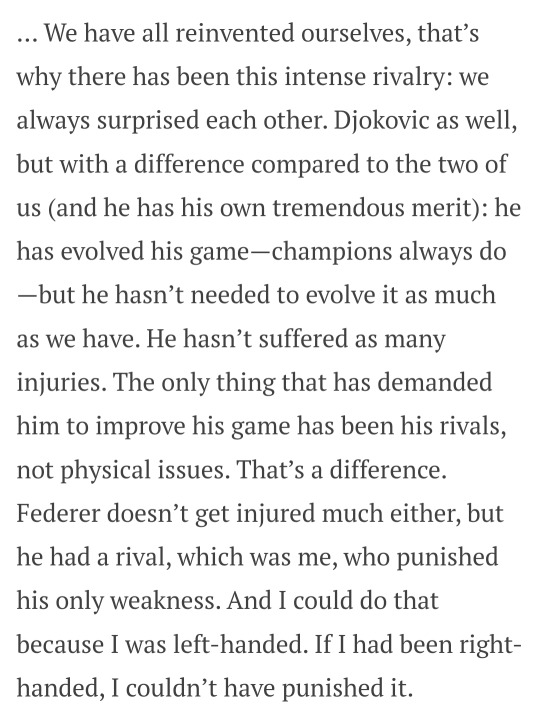
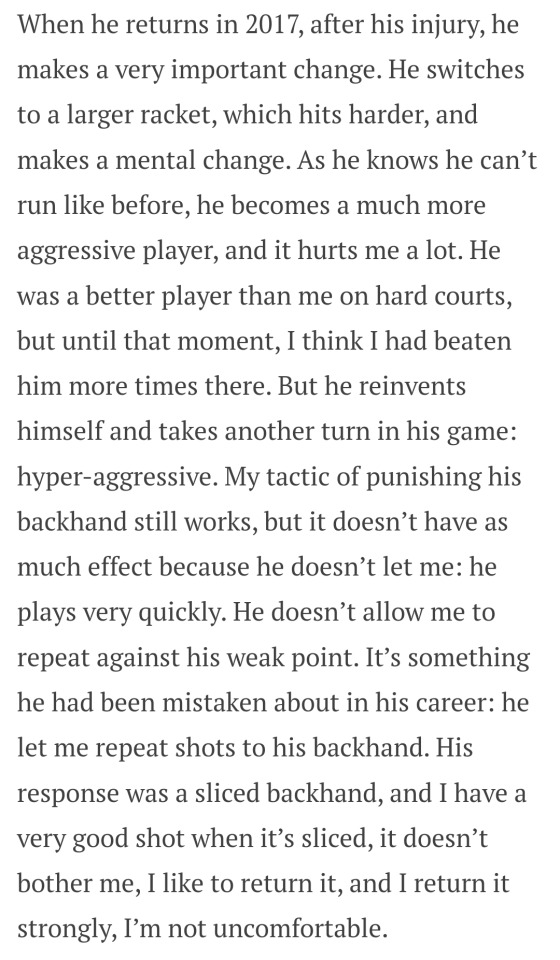


Rafa in an interview with EL PAÍS | English translation
139 notes
·
View notes
Text
the reason it's necessary these days more than ever to interrogate allyship is because a lot of seemingly well-intentioned, liberal perspective these days is actually cruelty and faux concern masquerading as kindness.
it reminds me a lot of NGOization of palestine. a lot of good people work in NGOs in occupied palestine. they offer support to children, they provide basic psychological and cultural services, they allow pathways for palestinians to travel, they are overall positive influences.
but from a development perspective, the proliferation of NGOs and UN deposits in occupied palestine has been detrimental. many recognizes this very early on, before the oslo accords. it creates reliance and hobbles palestinian self-sufficiency. that's why israel allows it. it keeps palestinians suspended in a pseudo-state that can be withdrawn arbitrarily. even the UNRWA which has had 59(!!!) of its employees killed, cannot publicly state that it was israel who killed them.
in fact, in 2022 six palestinian NGOs that focused on advocacy, BDS, human rights, addressing the occupation itself and israeli crimes were were designated by israel as terrorist organizations and raided. the organizations, their donors and their activities are heavily monitored and controlled by the israeli state. israel often points to them as proof that it is a functioning democracy, that it allows plurality and kindness to palestinians.
are these organizations bad in and of themselves? well (apart from the corruption and siphoning of funds) absolutely not. the people working in them are brave and necessary. palestinian life would be worse off without them.
but these organizations cannot be separated from the conditions that allow them to exist. they are a by-product of israel's attempts to whither away palestinian self-determination, a temporary salve and a tool of the occupation. most people working there are aware that critiquing their existence is not critiquing their work. in an ideal world they would not be the only alternative to palestinian civil society.
the point is, beware the people who give charity but do not accept critiquing the conditions that force people to be dependent on charity in the first place.
5K notes
·
View notes
Text
AMAZING article about what it means to participate in anti-Zionism work both online and in person.
If your anti-zionism does not in any way acknowledge that it is a way of thought and practice led by and for Palestinians, then you need to reevaluate your "anti-zionism" label.
Some passages that felt especially relevant to tumblr:
If we accept, as those with even the most rudimentary understanding of history do, that zionism is an ongoing process of settler-colonialism, then the undoing of zionism requires anti-zionism, which should be understood as a process of decolonisation. Anti-zionism as a decolonial ideology then becomes rightly situated as an indigenous liberation movement. The resulting implication is two-fold. First, decolonial organising requires that we extract ourselves from the limitations of existing structures of power and knowledge and imagine a new, just world. Second, this understanding clarifies that the caretakers of anti-zionist thought are indigenous communities resisting colonial erasure, and it is from this analysis that the strategies, modes, and goals of decolonial praxis should flow. In simpler terms: Palestinians committed to decolonisation, not Western-based NGOs, are the primary authors of anti-zionist thought. We write this as a Palestinian and a Palestinian-American who live and work in Palestine, and have seen the impact of so-called ‘Western values’ and how the centring of the ‘human rights’ paradigm disrupts real decolonial efforts in Palestine and abroad. This is carried out in favour of maintaining the status quo and gaining proximity to power, using our slogans emptied of Palestinian historical analysis.
Anti-zionist organising is not a new notion, but until now the use of the term in organising circles has been mired with misunderstandings, vague definitions, or minimised outright. Some have incorrectly described anti-zionism as amounting to activities or thought limited to critiques of the present Israeli government – this is a dangerous misrepresentation. Understanding anti-zionism as decolonisation requires the articulation of a political movement with material, articulated goals: the restitution of ancestral territories and upholding the inviolable principle of indigenous repatriation and through the right of return, coupled with the deconstruction of zionist structures and the reconstitution of governing frameworks that are conceived, directed, and implemented by Palestinians.
Anti-zionism illuminates the necessity to return power to the indigenous community and the need for frameworks of justice and accountability for the settler communities that have waged a bloody, unrelenting hundred-year war on the people of Palestine. It means that anti-zionism is much more than a slogan.
[...]
While our collective imaginations have not fully articulated what a liberated and decolonised Palestine looks like, the rough contours have been laid out repeatedly. Ask any Palestinian refugee displaced from Haifa, the lands of Sheikh Muwannis, or Deir Yassin – they will tell that a decolonised Palestine is, at a minimum, the right of Palestinians’ return to an autonomous political unit from the river to the sea.
When self-proclaimed ‘anti-zionists’ use rhetoric like ‘Israel-Palestine’ – or worse, ‘Palestine-Israel’ – we wonder: where do you think ‘Israel’ exists? On which land does it lay, if not Palestine? This is nothing more than an attempt to legitimise a colonial state; the name you are looking for is Palestine – no hyphen required. At a minimum, anti-zionist formations should cut out language that forces upon Palestinians and non-Palestinian allies the violence of colonial theft.
[...]
The common choice to centre the Oslo Accords, international humanitarian law, and the human rights paradigm over socio-historical Palestinian realities not only limits our analysis and political interventions; it restricts our imagination of what kind of future Palestinians deserve, sidelining questions of decolonization to convince us that it is the new, bad settlers in the West Bank who are the source of violence. Legitimate settlers, who reside within the bounds of Palestinian geographies stolen in 1948 like Tel Aviv and West Jerusalem, are different within this narrative. Like Breaking the Silence, they can be enlightened by learning the error of colonial violence carried out in service of the bad settlers. They can supposedly even be our solidarity partners – all without having to sacrifice a crumb of colonial privilege or denounce pre-1967 zionist violence in any of its cruel manifestations.
As a result of this course of thought, solidarity organisations often showcase particular Israelis – those who renounce state violence in service of the bad settlers and their ongoing colonisation of the West Bank – in roles as professionals and peacemakers, positioning them on an equal intellectual, moral, or class footing with Palestinians. There is no recognition of the inherent imbalance of power between these Israelis and the Palestinians they purport to be in solidarity with – stripping away their settler status. The settler is taken out of the historical-political context which afforded them privileged status on stolen land, and is given the power to delineate the Palestinian experience. This is part of the historical occlusion of the zionist narrative, overlooking the context of settler-colonialism to read the settler as an individual, and omitting their class status as a settler.
It is essential to note that Palestinians have never rejected Jewish indigeneity in Palestine. However, the liberation movement has differentiated between zionist settlers and Jewish natives. Palestinians have established a clear and rational framework for this distinction, like in the Thawabet, the National Charter of Palestine from 1968. Article 6 states, ‘The Jews who had normally resided in Palestine until the beginning of the Zionist invasion will be considered Palestinians.’
When individuals misread ‘decolonisation’ as ‘the mass killing or expulsion of Jews,’ it is often a reflection of their own entanglement in colonialism or a result of zionist propaganda. Perpetuating this rhetoric is a deliberate misinterpretation of Palestinian thought, which has maintained this position over a century of indigenous organising.
Even after 100 years of enduring ethnic cleansing, whole communities bombed and entire family lines erased, Palestinians have never, as a collective, called for the mass killing of Jews or Israelis. Anti-zionism cannot shy away from employing the historical-political definitions of ‘settler’ and ‘indigenous’ in their discourse to confront ahistorical readings of Palestinian decolonial thought and zionist propaganda.
[...]
In the context of the United States, the most threatening zionist institutions are the entrenched political parties which function to maintain the status quo of the American empire, not Hillel groups on university campuses or even Christian zionist churches. While the Anti-Defamation League (ADL) and the American Israel Public Affairs Committee (AIPAC) engage in forms of violence that suppress Palestinian liberation and must not be minimised, it is crucial to recognise that the most consequential institutions in the context of settler-colonialism are not exclusively Jewish in their orientation or representation: the Republican and Democratic Party in the United States do arguably more to manufacture public consent for the slaughtering of Palestinians than the ADL and AIPAC combined. Even the Progressive Caucus and the majority of ‘The Squad’ are guilty of this.
Leila Shomali and Lara Kilani
2K notes
·
View notes
Text
this blog is my diary and u r just living in it
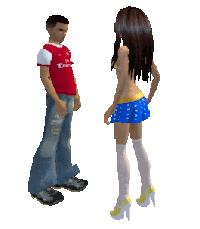
9K notes
·
View notes
Text

When I say this had me going feral...
44 notes
·
View notes
Text
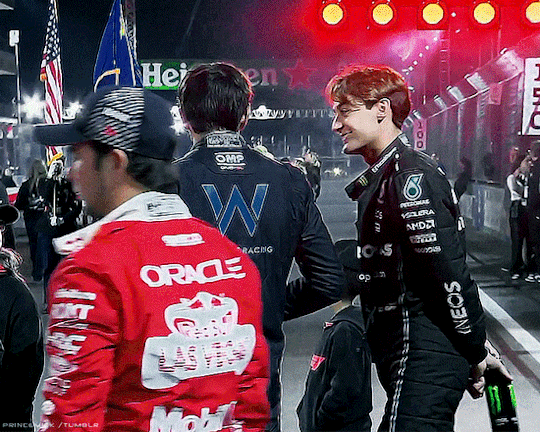
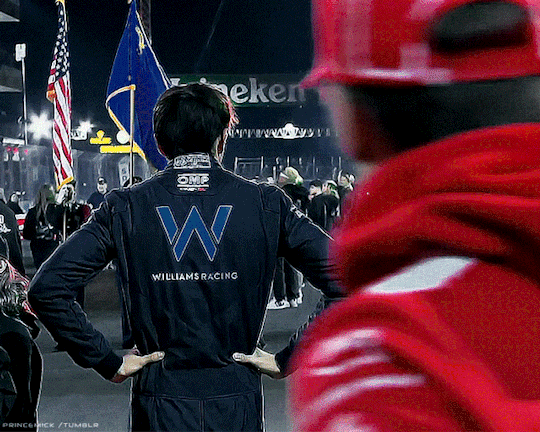
GEORGE AND ALEX // SUNDAY, LAS VEGAS GP 2023
2K notes
·
View notes
Text


November 19, 2023 - Las Vegas, USA
Source: Antonin Vincent / DPPI
1K notes
·
View notes

